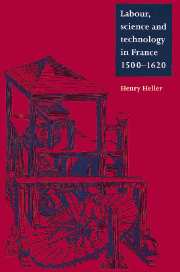Book contents
- Frontmatter
- Contents
- List of illustrations
- Preface
- List of abbreviations
- Introduction
- 1 The expansion of Parisian merchant capital
- 2 Labour in Paris in the sixteenth century
- 3 Civil war and economic experiments
- 4 Inventions and science in the reign of Charles IX
- 5 Expropriation, technology and wage labour
- 6 The Bourbon economic restoration
- 7 Braudel, Le Roy Ladurie and the inertia of history
- Bibliography
- Index
- CAMBRIDGE STUDIES IN EARLY MODERN HISTORY
Introduction
Published online by Cambridge University Press: 01 October 2009
- Frontmatter
- Contents
- List of illustrations
- Preface
- List of abbreviations
- Introduction
- 1 The expansion of Parisian merchant capital
- 2 Labour in Paris in the sixteenth century
- 3 Civil war and economic experiments
- 4 Inventions and science in the reign of Charles IX
- 5 Expropriation, technology and wage labour
- 6 The Bourbon economic restoration
- 7 Braudel, Le Roy Ladurie and the inertia of history
- Bibliography
- Index
- CAMBRIDGE STUDIES IN EARLY MODERN HISTORY
Summary
Bernard Palissy is the hero of the final chapter of The Conquest of Poverty: The Calvinist Revolt in Sixteenth Century France which I published in 1986. In that book I represented Palissy as an isolated figure who, while appalled by the tragedy of the onset of civil war, was nevertheless unique in his understanding of the economic and social problems which had helped to provoke the crisis. While retreating into a religious vision in the face of an increasingly uncertain future, Palissy nevertheless singled out the agrarian problem as a key to France's troubles. Under-investment in agriculture, responsible for the grain shortages and the high cost of food, was at the heart of the difficulties which were exacerbating the political and religious crisis into which France had fallen.
I portrayed Palissy as more or less a lone voice and saw his proposed remedy of an agrarian capitalism as Utopian in the French context. As I depicted it, the ongoing strength of seigneurialism and the absorption of the middle class into the ranks of the notables of the expanding state, foreclosed the possibility of a capitalist breakthrough in agriculture and a resolution of France's economic problems.
At a certain level there continues to be a certain truth to this view of France in the ancien régime.
- Type
- Chapter
- Information
- Publisher: Cambridge University PressPrint publication year: 1995



